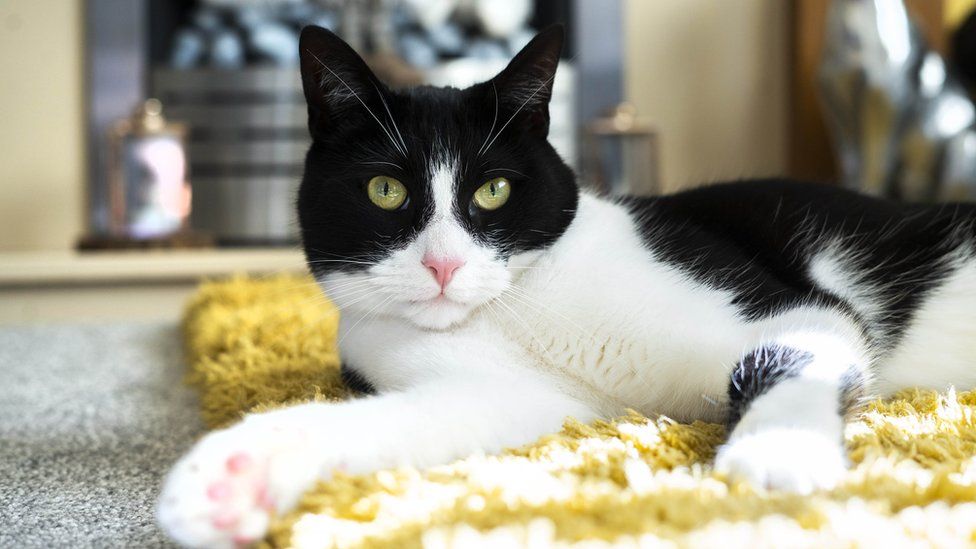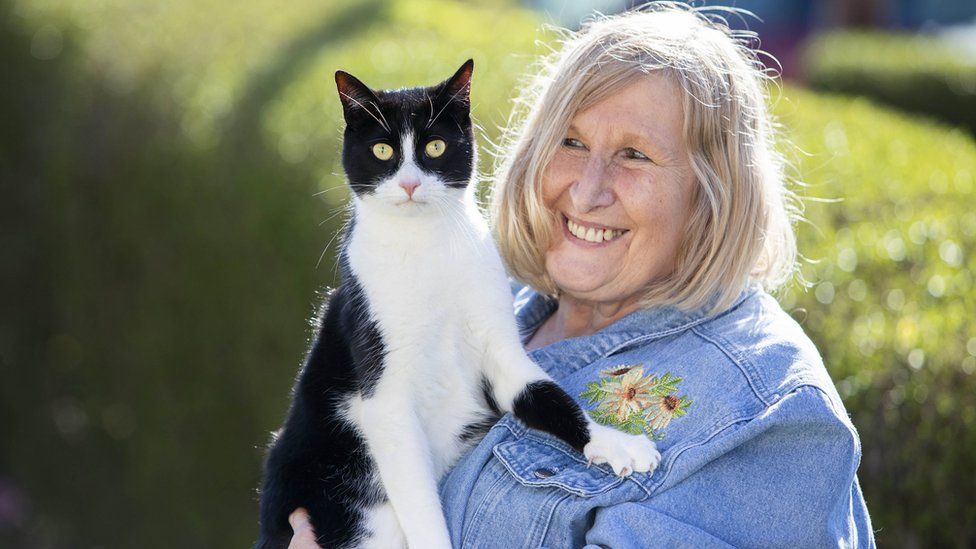Deaf Owner's Support Cat Wins National Award For Exceptional Hearing Abilities
Zebby, a two-year-old black and white cat from Chesterfield, in Derbyshire, has been honored with the prestigious title of Cats Protection's National Cat of the Year for his exceptional support to his deaf owner, Genevieve Moss, 66. Zebby, the deaf owner's support cat wins national award because of his remarkable ability to alert Ms. Moss to important sounds around the house, such as the phone or doorbell ringing, has earned him widespread recognition and admiration.
Author:Xander OddityReviewer:Dr. Felix ChaosphereJul 21, 202310.9K Shares160.7K Views

Zebby, a two-year-old black and white cat from Chesterfield, in Derbyshire, has been honored with the prestigious title of Cats Protection's National Cat of the Year for his exceptional support to his deaf owner, Genevieve Moss, 66. Zebby, thedeaf owner's support cat wins national awardbecause of his remarkable ability to alert Ms. Moss to important sounds around the house, such as the phone or doorbell ringing, has earned him widespread recognition and admiration.
Deaf Owner's Support Cat Wins National Award
Unlike trained service animals, Zebby's talents come from his innate intuition and care for his owner. He has not undergone any specialized training but has naturally taken on the role of being Genevieve's vigilant and caring companion. Thousands of pets competed for the title at the National Cat Awards, organized by the feline welfare charity, with Zebby standing out as the overall winner after a public vote.
The award ceremony took place at the historic Wilton's MusicHall in London, where Zebby was one of four finalists in the Family Fur-ever category. Celebritiesand experts, including former footballer David Seaman MBE and veterinarian and TV personality Dr. Scott Miller, were part of the panel that crowned him the National Cat of the Year.
Genevieve Moss expressed her pride and happiness in Zebby's achievement. As a person with hearing loss, Ms. Moss relies on Zebby's assistance to be aware of important auditory cues and talks about how grateful she is for Zebby.
“„I am so proud of Zebby for showing the world how intuitive and caring cats can be, and what a positive effect they can have on people's lives. Without my hearing aid, I can't hear anything, but now I have Zebby to help me.- Genevieve Moss
Zebby's support goes beyond merely alerting Genevieve to ringing phones or doorbells. He has developed a unique way of communicating with her, ensuring she is aware of unusual noises even during the night.
“„In the night, if there's an unusual noise, he will bat me on my head to wake me up and let me know.- Genevieve Moss
This unwavering dedication and companionship have brought immense comfort and security to her life.
Moreover, Zebby takes on additional tasks, making him an invaluable helper around the house. He assists Ms. Moss by picking up the mail from the doormat and carefully carrying it to her room in his mouth. He also brings her slippers, showcasing his loving and thoughtful nature.
Describing the unique bond she shares with Zebby, Genevieve said:
“„Zebby is very special, I've never known a cat quite like him. He loves to be around me, wherever I am, he's not far behind.- Genevieve Moss
For Genevieve, living alone with hearing impairment could have been lonely, but Zebby's presence has filled her life with joy and companionship. Genevieve added affectionately.
“„He's my hero.- Genevieve Moss
The award-winning feline hero received a trophy and a prize package that included a £200 pet store voucher. Ashley Fryer, the organizer of Cats Protection's National Cat Awards, was deeply moved by Zebby and Genevieve's heartwarming story.
“„From the moment we read his entry form, we knew Zebby was something special. Zebby is clearly devoted to Genevieve, and their story highlights the powerful bond that exists between people and their cats.- Ashley Fryer, Organizer of Cats Protection's National Cat Awards
Indeed, Zebby's story serves as a shining example of the profound impact animals can have on the lives of their human companions. His innate ability to provide support and companionship to Genevieve Moss demonstrates the incredible depth of the human-animal bond, reminding us of the love and comfort that our feline friends can bring to our lives.
Benefits Of Support Pets For Individuals With Disabilities
Support pets, like Zebby, a remarkable two-year-old black and white cat, play a vital role in the lives of individuals with disabilities, offering a range of physical, emotional, and social benefits. Zebby's story is a testament to the incredible bond between support pets and their human partners. Zebby's owner, Genevieve Moss, who is deaf, credits her feline friend for providing essential assistance, tapping her to alert her to sounds like the phone or doorbell ringing.
Let's explore the various advantages that support pets, exemplified by Zebby, bring to individuals with disabilities, enriching their lives and fostering an unbreakable connection of love and support.
Emotional Support
Support pets offer invaluable emotional support to individuals facing disabilities. The unconditional love and companionship they provide can significantly alleviate feelings of loneliness, anxiety, and depression. The mere presence of a support pet can create a sense of calm and security, acting as a constant source of comfort in challenging times. Interacting with these furry friends releases oxytocin, the "bonding hormone," fostering emotional stability and reducing stress levels.

Best Cat Breeds for Emotional Support
Physical Assistance
Service animals are specially trained to assist individuals with various disabilities, empowering them to overcome physical challenges. Guide dogs, for instance, offer mobility assistance to those with visual impairments, helping them navigate obstacles safely. Mobility assistance dogs can retrieve items, open doors, or even help with balance, offering newfound freedom and autonomy. The incredible intelligence and training of these support pets allow individuals to perform everyday tasks with greater ease and confidence.
Social Interaction
Support pets act as powerful social catalysts for individuals with disabilities. These furry companions serve as wonderful conversation starters, drawing the attention and curiosity of others. As a result, people with disabilities often experience increased social interaction and a broader support network. The presence of a support pet can break down barriers and foster genuine connections, combating feelings of isolation and promoting social inclusion.
Increased Independence
Support pets contribute significantly to the independence of individuals with disabilities. The assistance provided by service animals allows individuals to accomplish tasks that may have previously required assistance from others. This newfound independence enhances self-esteem, self-reliance, and overall confidence, empowering individuals to navigate their lives with greater autonomy.
Stress Reduction
Interacting with support pets has a profound impact on stress reduction. Spending time with these loving companions triggers the release of endorphins, known as "feel-good" hormones, which promote relaxation and emotional well-being. This natural stress-relief mechanism proves particularly valuable for individuals with disabilities who may face additional stressors related to their condition. Support pets offer a non-judgmental and safe outlet for emotional release, helping to manage stress and maintain emotional balance.
Improved Physical Health
Support pets can positively influence physical health outcomes for individuals with disabilities. The act of caring for a pet, including walking, grooming, and playing, promotes regular physical activity and exercise. Engaging in these activities can lead to improved cardiovascular health, enhanced muscle tone, and increased flexibility. Moreover, the routine associated with pet care can lead to better sleep patterns, contributing to overall well-being.
Enhanced Communication Skills
Support pets can facilitate communication for individuals with certain disabilities. For instance, therapy animals have been instrumental in helping children with speech disorders improve their communication skills. The presence of a support pet can create a non-threatening and encouraging environment, motivating individuals to communicate and express themselves more freely.
Sense Of Purpose And Responsibility
For individuals with disabilities, having a support pet provides a sense of purpose and responsibility. Caring for a pet involves meeting their needs, such as feeding, grooming, and training, which fosters a structured daily routine. This responsibility can enhance self-esteem and self-worth, as individuals realize their ability to care for another living being and contribute positively to their pet's well-being.
Reduced Anxiety In Public Settings
Support pets can help alleviate anxiety and discomfort when navigating public spaces for individuals with disabilities. For instance, individuals with autism or sensory processing disorders may find crowded or unfamiliar environments overwhelming. The presence of a support pet offers a calming and reassuring presence, helping to mitigate anxiety and facilitating a smoother experience in such situations.
Building Trust And Coping Skills
Support pets can play a vital role in building trust and coping skills in individuals with disabilities, particularly those who have experienced trauma. The unwavering loyalty and non-judgmental nature of support pets create a safe and secure environment. This safe space allows individuals to develop trust in their support pet, which can extend to human relationships and promote healthier coping mechanisms.
Motivation For Rehabilitation
In cases of physical disabilities or injuries, support pets can serve as powerful motivators during the rehabilitation process. The goal of regaining mobility or function becomes more tangible and rewarding when individuals can interact with their support pet throughout the recovery journey. The presence of a beloved pet can inspire perseverance and determination, encouraging individuals to reach their rehabilitation goals.
Positive Impact On Mental Health Therapy
In therapeutic settings, support pets can complement mental health treatment approaches. The presence of a support pet during counseling or therapy sessions can create a calming and nurturing environment, encouraging individuals to open up and express themselves more freely. Therapy animals can help reduce stress and emotional distress during therapy, enhancing the effectiveness of mental health interventions.
Elevating Quality Of Life
Ultimately, the profound and multifaceted benefits of supporting pets culminate in an overall improvement in the quality of life for individuals with disabilities. These faithful companions enrich their lives, providing unconditional love, support, and practical assistance. Support pets help individuals with disabilities overcome challenges, engage with the world around them, and experience the joys of companionship and emotional connection.
Promoting Inclusion And Advocacy
Support pets have the potential to promote inclusion and raise awareness about disabilities. By accompanying individuals with disabilities in various public settings, these remarkable animals challenge stereotypes and misconceptions. They become ambassadors for disability advocacy, demonstrating the capabilities and contributions of individuals with disabilities.

What Does an Emotional Support Animal Really Do?
Inspiring Emotional Bonds And Lifelong Friendships
The relationship between individuals with disabilities and their support pets often transcends words. These extraordinary bonds are filled with love, trust, and unwavering loyalty. Support pets become cherished companions and lifelong friends, bringing immeasurable joy and comfort to their human partners. In turn, these supportive relationships enrich the lives of both individuals and their four-legged allies.
People Also Ask
How Do Pets Provide Social Support?
Pets offer social support through physical contact, shared activities, and being confidants, similar to friends and family. Dogs, in particular, are more readily available sources of support.
How Do Pets Provide Emotional Support?
Interacting with a loving pet, such as stroking, hugging, or simply being in their presence, can quickly calm and soothe feelings of stress and anxiety. Pets also provide companionship, easing loneliness, and encouraging healthy exercise, which boosts mood and helps alleviate depression.
What Are The Benefits Of Pets On Mental Health?
Pets can help ease anxiety and boost self-confidence. They provide a non-judgmental listening ear and offer unconditional love, making them especially valuable for those who feel isolated or misunderstood. Pets can significantly contribute to improved mental well-being and overall happiness.
Conclusion
In conclusion, the heartwarming story of Zebby, the deaf owner's support cat wins national award because of his unwavering companionship to Genevieve Moss, highlights the extraordinary contributions of support pets for individuals with disabilities. Zebby's essential assistance exemplifies the profound physical, emotional, and social benefits that support pets bring into the lives of those facing challenges.
The incredible bond between support pets and their human partners fosters a sense of belonging, independence, and joy. As we celebrate Zebby's recognition and the countless other support pets making a difference, let us continue to advocate for the invaluable role they play in enhancing the lives of individuals with disabilities. These furry champions truly make the world a brighter and more inclusive place, offering a source of love and strength to those in need.
Jump to
Deaf Owner's Support Cat Wins National Award
Benefits Of Support Pets For Individuals With Disabilities
Emotional Support
Physical Assistance
Social Interaction
Increased Independence
Stress Reduction
Improved Physical Health
Sense Of Purpose And Responsibility
Reduced Anxiety In Public Settings
Building Trust And Coping Skills
Motivation For Rehabilitation
Positive Impact On Mental Health Therapy
Elevating Quality Of Life
Promoting Inclusion And Advocacy
Inspiring Emotional Bonds And Lifelong Friendships
People Also Ask
Conclusion

Xander Oddity
Author
Xander Oddity, an eccentric and intrepid news reporter, is a master of unearthing the strange and bizarre. With an insatiable curiosity for the unconventional, Xander ventures into the depths of the unknown, fearlessly pursuing stories that defy conventional explanation. Armed with a vast reservoir of knowledge and experience in the realm of conspiracies, Xander is a seasoned investigator of the extraordinary.
Throughout his illustrious career, Xander has built a reputation for delving into the shadows of secrecy and unraveling the enigmatic. With an unyielding determination and an unwavering belief in the power of the bizarre, Xander strives to shed light on the unexplained and challenge the boundaries of conventional wisdom. In his pursuit of the truth, Xander continues to inspire others to question the world around them and embrace the unexpected.

Dr. Felix Chaosphere
Reviewer
Dr. Felix Chaosphere, a renowned and eccentric psychiatrist, is a master of unraveling the complexities of the human mind. With his wild and untamed hair, he embodies the essence of a brilliant but unconventional thinker. As a sexologist, he fearlessly delves into the depths of human desire and intimacy, unearthing hidden truths and challenging societal norms.
Beyond his professional expertise, Dr. Chaosphere is also a celebrated author, renowned for his provocative and thought-provoking literary works. His written words mirror the enigmatic nature of his persona, inviting readers to explore the labyrinthine corridors of the human psyche.
With his indomitable spirit and insatiable curiosity, Dr. Chaosphere continues to push boundaries, challenging society's preconceived notions and inspiring others to embrace their own inner tumult.
Latest Articles
Popular Articles
